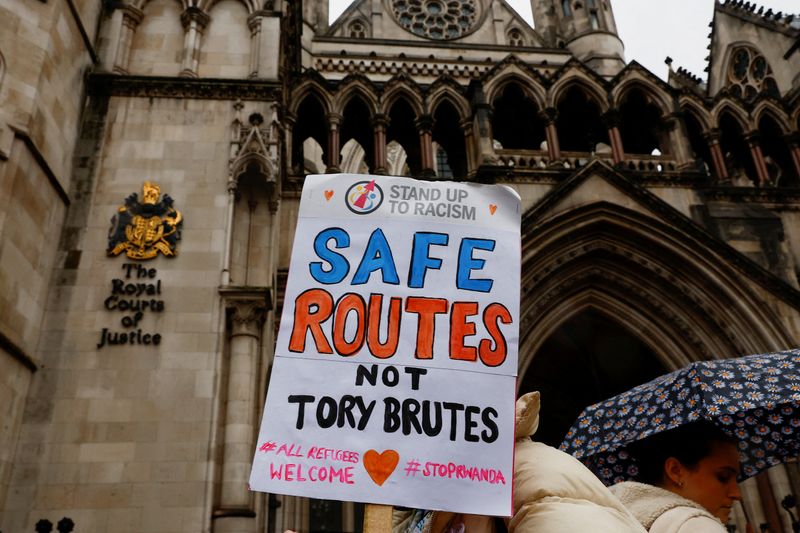By Michael Holden
LONDON (Reuters) - The UK Supreme Court ruled on Wednesday that the government's plan to send asylum seekers to Rwanda was unlawful, delivering a major blow to Prime Minister Rishi Sunak's pledge to stop people arriving in small boats.
Here are details about the case and the issue:
WHY IS IMMIGRATION SUCH AN ISSUE IN BRITAIN?
Taking back control of the country's borders and ending the free movement of people was a major factor that led to the 2016 vote for Britain to leave the European Union.
Successive Conservative governments had promised to cut net migration to under 100,000 annually before dropping that pledge before an election in 2019.
While official data recording has changed, net immigration has continued to rise since Brexit, hitting a record of 606,000 in 2022, partly due to new visa routes for arrivals from Ukraine and Hong Kong.
WHAT IS BRITAIN'S RWANDA PLAN?
The Rwanda plan, struck in April 2022 by then Prime Minister Boris Johnson, is designed to deter asylum seekers from making the dangerous journey of about 20 miles (32 km) across the Channel from Europe in small boats or inflatable dinghies to England's southern beaches.
Last year, a record 45,775 people were detected arriving without permission in Britain in this way. So far this year, more than 27,000 have arrived on small boats.
Under the scheme, anyone who arrived in Britain illegally after Jan. 1 last year faced deportation to Rwanda, some 4,000 miles (6,400 km) away, where their claims would be assessed.
However, the first deportation flight in June 2022 was blocked by a last-minute injunction from the European Court of Human Rights, barring any removals until the conclusion of legal action in Britain.
The Supreme Court on Wednesday unanimously rejected the government's appeal against an earlier ruling that migrants could not be sent to Rwanda because it could not be considered a safe third country.
WHAT ARE THE GOVERNMENT'S OPTIONS NOW?
The sacked British interior minister Suella Braverman on Tuesday launched a blistering attack on Sunak, saying he had failed to prepare any sort of credible "plan B" if the programme to deport asylum seekers to Rwanda failed in the courts.
Government officials say there are options, including negotiating a new deal with Rwanda, upgrading the agreement from a memorandum of understanding and including new safeguards. A new treaty passed by parliament could make it harder for the courts to intervene, according to officials.
Supreme Court President Robert Reed said changes needed to prevent anyone from being returned to their home country could be delivered in the future: "but they have not been shown to be in place now".
Other options include adding new nations, such as Turkey and Egypt to the list of so-called safe countries making it easier to reject asylum claims and return them to their home countries, officials said.
WILL BRITAIN LEAVE THE EUROPEAN CONVENTION ON HUMAN RIGHTS?
Some in the government have strongly hinted Britain would consider leaving the European Convention on Human Rights if it thwarted the Rwanda scheme. Braverman is likely to lead such demands.
Critics say pulling out of the Convention, which Britain played a leading role in creating in 1950 to protect individuals' human rights, or the Court would deal a severe blow to Britain's international reputation.
The Court itself said last year it dealt with 3,110 requests for interim measures but just five related to Britain, while of its 1,163 judgments last year, only four concerned Britain.
WHY IS THE RWANDA POLICY SO IMPORTANT TO SUNAK?
After becoming prime minister in October last year he made "stopping the boats" one of his top five priorities.
Britain is currently spending more than 3 billion pounds a year on dealing with asylum applications, with the cost of housing migrants in hotels and other accommodation while their claims are processed running at about 6 million pounds a day.
Sending each asylum seeker to the African country would cost on average 169,000 pounds ($213,450), the government has said.
According to government figures in August, the backlog of asylum applications waiting for an initial decision hit a record high of more than 134,000, or 175,457 once dependents were included. Sunak had promised to clear this.
HOW DOES BRITAIN COMPARE WITH OTHER COUNTRIES ON IMMIGRATION?
Australia pioneered the concept of holding asylum seekers in offshore detention centres. Denmark has signed a similar agreement with Rwanda, but has yet to send any migrants there.

The 27-nation EU is seeking to strike an agreement on how to share out the asylum seekers who arrived on its shores.
According to the House of Commons Library, which provides research for British lawmakers, there were about 13 asylum applications for every 10,000 people living in Britain in 2022, compared with 22 applications for every 10,000 people in the EU.